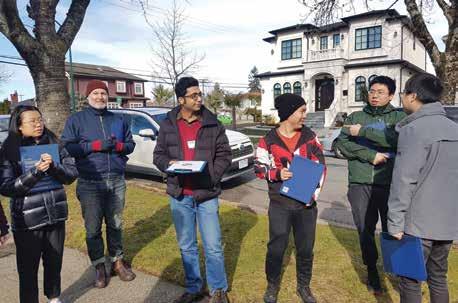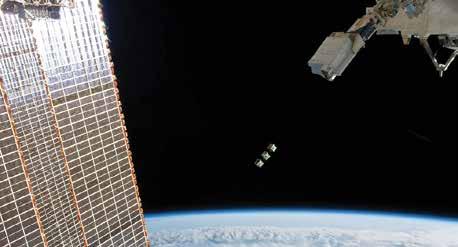
5 minute read
of COVID-19 Pg
WILDFIRE IN THE ERA OF COVID-19 Lori Daniels
The term “new normal” is taking on yet another new meaning for us in British Columbia. Wildfires defined 2017 and 2018, when intense, fastmoving and uncontrollable fires burned a record-breaking 2.5 million hectares of grasslands and forests. Those fires emitted two and three times the normal annual carbon dioxide emissions for our entire province and generated smoke that made air quality in western Canada the most hazardous in the world for many days. With the 2020 wildfire season upon us, the long-range forecast for this summer indicates well above average potential for fire in BC.
Advertisement
This year, COVID-19, which primarily infects the respiratory tract, has redefined our daily lives. Experts at UBC’s School of Public Health and BC (BCCDC) Centre for Disease Control tell us COVID-19 infections are exacerbated by wildfire smoke, which weakens our natural defenses. People at high risk of the effects of COVID19 overlap with those who are most vulnerable to the impacts of wildfire smoke, the elderly and people with chronic heart or lung disease, asthma,
or diabetes. Deterioration in air quality may lead to more numerous or severe COVID-19 infections, while improvements to air quality may provide protection from the potentially severe effects of the virus.
Now, it is more important than ever to take proactive measures to reduce smoke and wildfire impacts. Several actions are already underway. Starting mid-April, the BC Ministry of Environment and Climate Change Strategy, BC Wildfire Service, Metro Vancouver, and provincial public health authorities worked together to implement burning restrictions to reduce exposure to harmful smoke including the temporary suspension of prescribed burns.
Minimizing accidental wildfire ignitions is critical. So far, there have been 139 fires in BC, 83% of which were caused by people. On average, 40% of wildfires in BC are humancaused and preventable. This year, extra care is needed. Outdoor enthusiasts need to ensure campfires are extinguished properly and be vigilant when using all-terrain vehicles in the back country. We can anticipate precautionary fire bans and restrictions during hot, dry weather.
Health experts from the BC Centre for Disease Control recommend we prepare for wildfire smoke in advance. Reducing exposure means limiting smoke particles in your home. Closing doors and windows is a good first step, but can contribute to heat stress if you do not have air conditioning. Portable air purifiers very effectively remove small particles from indoor air, as do filters and special settings on forced air units.
Becoming FireSmart is another way we can prepare for the fire season – especially since many of us live in fireprone communities. Both FireSmart BC and FireSmart Canada provide excellent resources and suggestions for proactive ways to prepare you home and property. FireSmart Canada recommends reviewing safety gear and tips before your start. The following actions are among my favourites: • Use the FireSmart Begins at Home • App to assess your home. Clear leaves, pine needles, and combustible debris from your roof, gutters, porch, and deck. Dispose • of debris. Rake and remove pine needles, dry leaves, and combustible debris within 1.5 metres of your home.
Expand up to 10 metres if you can. • Dispose of debris. If your woodpile is closer than 10 metres, relocated it away from • your home. On mature trees, prune branches within two metres from the ground. • Dispose of debris. Ensure all screened vents have mesh that is a maximum of 3mm • to resist an ember storm. Develop a wildfire evacuation plan • for your home and family. Help an elderly neighbour do
FireSmart work to their home
Dr Lori Daniels is a professor in the Department of Forest and Conservation Sciences. She can be reached at Lori. Daniels@ubc.ca.
SUCCESSFUL PILOT PAVES THE WAY FOR FUTURE CLIMATE ACTION TRAINING IN VANCOUVER NEIGHBOURHOODS
Cheryl Ng
Through an interactive outdoor tour, participants learn to identify climate change causes, impacts, mitigation, and adaptation in the neighbourhood

Climate action can be fun, neighbourly, and local. This is the message that UBC’s Collaborative for Advanced Landscape Planning (CALP) aimed to foster through its recent Cool ‘Hood Champs program. Using the popular Citizen’s Coolkit throughout a series of interactive workshops, the CALP team trained local residents in Vancouver to become climate champions in their neighbourhoods. Key highlights Kylie Green
The new home of the Alex Fraser Research Forest (AFRF) is a 55-acre property located on the Fox Mountain plateau just 5.5km from the city limits of Williams Lake. This new property will serve as our main office and will offer accommodation.
The property is half forested and half grazing land, with a five-bedroom house, insulated and heated shop, uninsulated pole barn, and open-air barn. The property also boasts access to its own pond/skating rink, and the surrounding area of Fox Mountain is included: outdoor activities to learn about climate change and urban forestry, hands-on mapping exercises to identify vulnerabilities and envision an ideal climate-friendly neighbourhood, and crafting of personal climate action plans. Participants were even able to meet and be inspired by existing champions like Jim Boothroyd and Andrea Sara from Green Bloc.
The first cohort successfully finfamous for world class mountain biking, hiking, and all sorts or outdoor recreational activities.
Researchers will be able to collaborate easily while living and working from one location, having improved access to the greater Cariboo region. We will facilitate ongoing research and education in the region on forest resilience, fire recovery, First Nations’ forest management, and forest governance.
Students will have an opportunity to engage in hands-on forest stand management activities on a property ished their program at Killarney Community Centre in March 2020, while the second cohort was treated to a highly-interactive online version amidst COVID-19. In total, 90% of participants felt they learnt about fun ways to engage their friends, family, and neighbours in climate action, while 80% felt more motivated and confident to take climate action. All in all, the program trained over 30 champions, with many going on to plant shade trees in their yards and implement their own action plans. At least six other organizations, including the Kitsilano and Trout Lake Community Associations and the City of Victoria, have requested for us to conduct similar programs for them. The overwhelmingly positive response to Cool ‘Hood Champs has been extremely encouraging, and certainly paves the way for more capacity-building at the neighbourhood scale.
Cheryl Ng is the engagement coordinator for the Faculty’s Collaborative for Advanced Landscape Planning (CALP).
ALEX FRASER RESEARCH FOREST HAS A NEW HOME
She can be reached at cheryl.ng@ubc.ca. not subject to Provincial forest management legislation. The agriculture opportunities on the property open new potential for research on agroforestry and improved range management practices.
While COVID-19 has delayed our move and our Grand Opening, we remain optimistic that this property will soon be a hub of activity in the Cariboo-Chilcotin.
Kylie Green is the administration manager at AFRF. She can be reached at kylie.green@ubc.ca.


